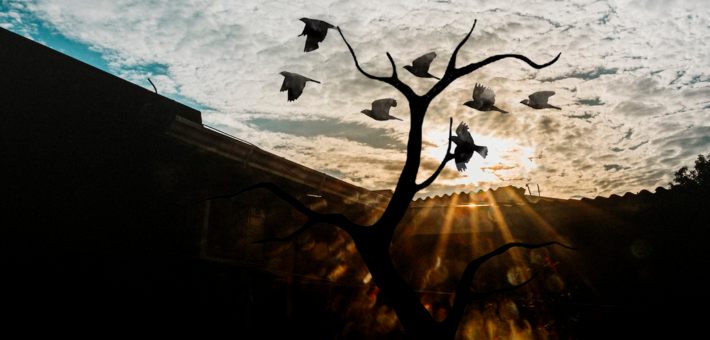Commentary on Isaiah 9:1-7
How do we speak of hope in a world filled with terror? This perennial question confronted each of the speakers whose words now constitute the book of Isaiah. A permanent solution eluded them because centuries punctuated by the horrors of war, forced migration and resettlement, and all the accompanying tragedies kept generating dialogue about the work of God in such a world. The ongoing conversation mattered, and it matters still.
The oracle at hand probably comes from the eighth-century prophet who gave the book its name. It speaks of “light” but acknowledges the “darkness.” The geographic locations listed point to the Assyrian partition of the northern kingdom of Israel in 732 BCE, prior to the final annexations a decade later. However, the oracle resists being stuck in its original historical setting. Even if, as many scholars think, this poem originated in connection with a royal coronation, imitating the old Egyptian regal language in which the king’s “birth” meant his ascent to power, the placement of the text in a larger literary context allows it to mean more. Its hope-filled language points to worlds not confinable to a single moment. Those worlds can emerge only through a close reading that triggers new imagination.
First, the close reading. The opening verse introduces both the immediately following lines and the verses that follow (Isaiah 9:8–10:4). The prose introduction in verse 1 contrasts a suffering-filled past with a glory-filled future. The contrast uses the language of shame and honor or, more literally, of “making light” and “making heavy.” A humiliated people find a better future.
Moreover, the contrast of times plays out in the rest of the chapter, not just in the hope oracle of verses 2–7. The introduction speaks of past, then future, and the rest of the chapter of future, then past. The dismal present, when victims turn around and victimize others, always remains a possible outcome. But so does the alternative future, in which human power works for “justice” and “peace.”
Verses 2–7 locate the vision of “peace without end” in a person, the longed-for ruler who will embody life-giving virtues. This person will be a “counselor of wonder” (wise in times of crisis and confusion), “divine warrior” (resolute, competent), “eternal father” (compassionate to dependents), and “a prince of peace” (the name is self-explanatory). The titles do not reduce to character traits, of course. They evoke and provoke more than describe.
Admittedly, locating hope in an individual ruler, as this text does, seems problematic because we know at first hand how individual leaders can try to corrupt institutions, even religion, for their own aims. Kings inevitably disappoint. But the substitute for this text’s vision may not be an idealized happy society with justice seeping from the bottom up. Rather, the alternative takes the terrifying form of the Assyrian emperors and the brutal apparatus they head. In contrast to such self-serving rulers, who ignore law and basic morality, the text’s favored prince sustains a state of peace resting on justice. If bad rulers can infect everyone with despair, good ones may inspire hope, at least in limited ways.
It is not surprising, therefore, that at least one early Christian text cited this text in connection with the work of Jesus, the “prince of peace” par excellence (Matthew 4:15–16). Matthew’s citation owes something to Jesus’ origins in Galilee, Isaiah’s place of darkness and light, but it owes more to the Evangelist’s perception of the connection between hope and repentance. In Matthew’s telling, “Repent because the kingdom is near” follows the quotation from Isaiah. The divine promise of renewal leads human beings to assume proper agency in their own lives, including the elimination of moral and spiritual obstacles to the wholeness that accompanies virtue.
More significantly, Matthew accepts Isaiah’s invitation to hope for a world in which God’s chosen representative will model a proper human life. That modeling will lead the whole community to dedicate itself to the qualities that, together, constitute “light.” In doing so, he picks up the hope that the already ancient text of Isaiah had articulated. In contrast to the brutality of an empire (Assyrian, Roman, or any other) bent on self-aggrandizement, the people of God will burn the blood-soaked garments, break the yokes of servitude, and celebrate a new world dawning in and around them.
Now the imagination. Matthew reimagined Isaiah’s text one way, but that path does not foreclose others. It does, however, caution us against assuming that any leader other than the Messiah can reliably deliver on the promises of peace and justice. Isaiah 9 has already opened the door to the possibility of God working on behalf of human beings under desperate circumstances. It has also invited its readers to expect light after their own time of darkness. The preservation of the Isaianic text beyond the moment of its original composition indicates its capacity to inspire new acts of imagination. Subsequent readers have found it effective in doing so.
Surely, imagination can draw on several resources. These include the curation of the past, which is why Isaiah cites the old stories of the defeat of Midianite invaders (see Judges 6–7).
They also include the power of metaphor. This is why the poem constructs a chain of images: light/darkness (verse 2), joy at a successful harvest (verse 3), joy over plunder (verse 3), broken yokes previously binding forced migrants (verse 4), and selected images of warfare and its aftermath (verse 5). Each of these images could trigger many associations, but the disciplined poetry in Isaiah 9 opts for a few to preface the key imagery of the coming king. The others remain up to the reader.
And the resources for imagination also include theological commitments. In this case, the prophet assumes YHWH’s agency (“you” in verse 3 and YHWH’s “zeal” or “radical commitment” in verse 7). The prophetic text’s clarity about the nature of the deity underwrites its hopeful vision. Israel’s God is not a slave to human history.
How do we speak in a world filled with terror? This text shows us a way.
PRAYER OF THE DAY
God of light,
There can be overwhelming obscurity in this world. But you shine your light and increase joy, and for your brilliance we are grateful. Amen.
HYMNS
Immortal, invisible, God only wise ELW 834
Creator of the stars of night ELW 245, H82 60, UMH 692, NCH 111
When twilight comes ELW 566
CHORAL
True Light, Keith Hampton


November 16, 2025